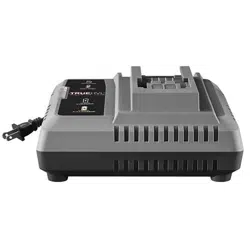Loading ...
Loading ...
Loading ...

11
CHARGING A HOT OR COLD BATTERY
PACK
If the battery pack is out of the normal
temperature range, the red LED will shine and
the green LED will go off. When the battery
pack cools down to approximately 122°F
(50°C) or warms to more than 37°F (3°C), the
charger will automatically begin charging.
DEFECTIVE BATTERY PACK OR
CHARGER
If the charger detects a problem, the red LED
will begin ashing and the green LED will be
off.
1. If registering as defective, remove and
reinsert the battery pack in the charger.
If the LEDs still read “defective” a second
time, try charging a different battery pack.
2. If a different battery pack charges normally,
have the rst, defective battery pack
serviced by an Authorized SKILSAW
Service Station.
3. If a different battery pack also indicates
“defective”, unplug the charger and wait
until the red LED goes out, then reconnect
the plug to the power supply. If the red
LED on the charger still displays defective,
the charger may be defective. Have
the charger serviced by an Authorized
SKILSAW Service Station.
Maintenance
SERVICE
WARNING
Preventive maintenance
performed by
unauthorized personnel may result in
misplacing of internal wires and
components which could cause serious
hazard. We recommend that all tool service
be performed by a SKILSAW Factory Service
Center or Authorized SKILSAW Service
Station.
GENERAL MAINTENANCE
WARNING
When servicing, use
only identical replacement
parts. Use of any other parts could create
a hazard or cause product damage.
Periodically inspect the entire product for
damaged, missing, or loose parts such as
screws, nuts, bolts, caps, etc. Please contact
customer service or an authorized service
center for assistance.
CLEANING
WARNING
To avoid serious personal
injury, always remove
the battery pack from the charger/tool
when cleaning.
WARNING
The tool may be cleaned
most effectively with
compressed dry air. Always wear safety
goggles when cleaning tools with
compressed air. Do not attempt to clean by
inserting pointed objects through openings.
WARNING
Certain cleaning agents
and solvents damage
plastic parts. Some of these are: gasoline,
carbon tetrachloride, chlorinated cleaning
solvents, ammonia and household
detergents that contain ammonia.
STORAGE
Store the charger indoors in a place that is
inaccessible to children. Keep it away from
corrosive agents.
Loading ...
Loading ...
Loading ...
